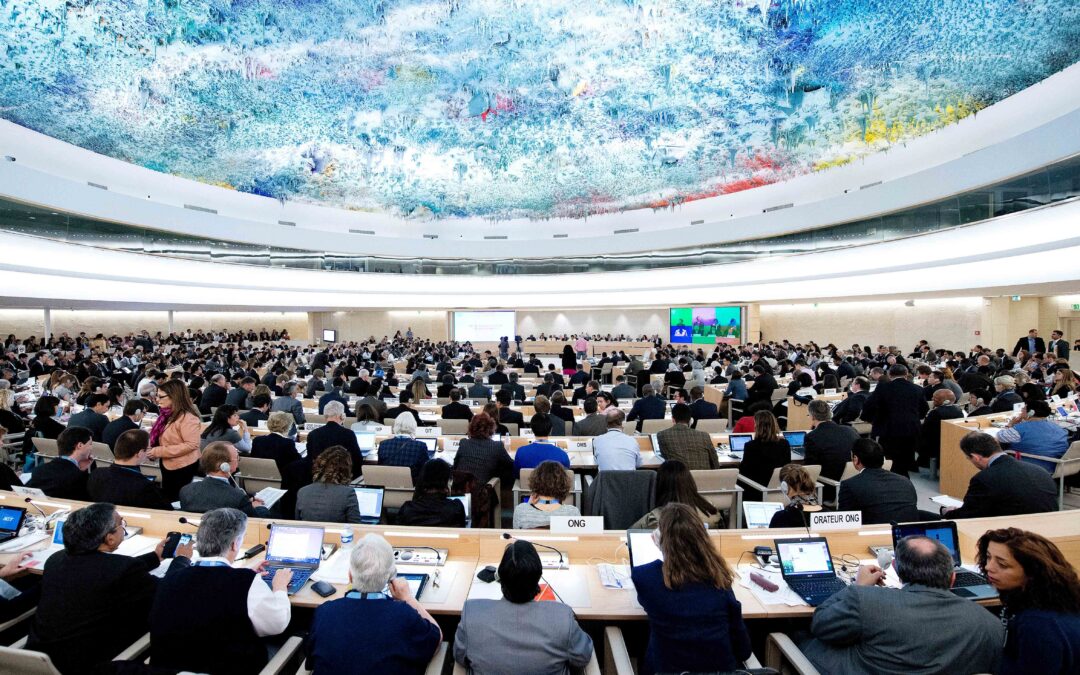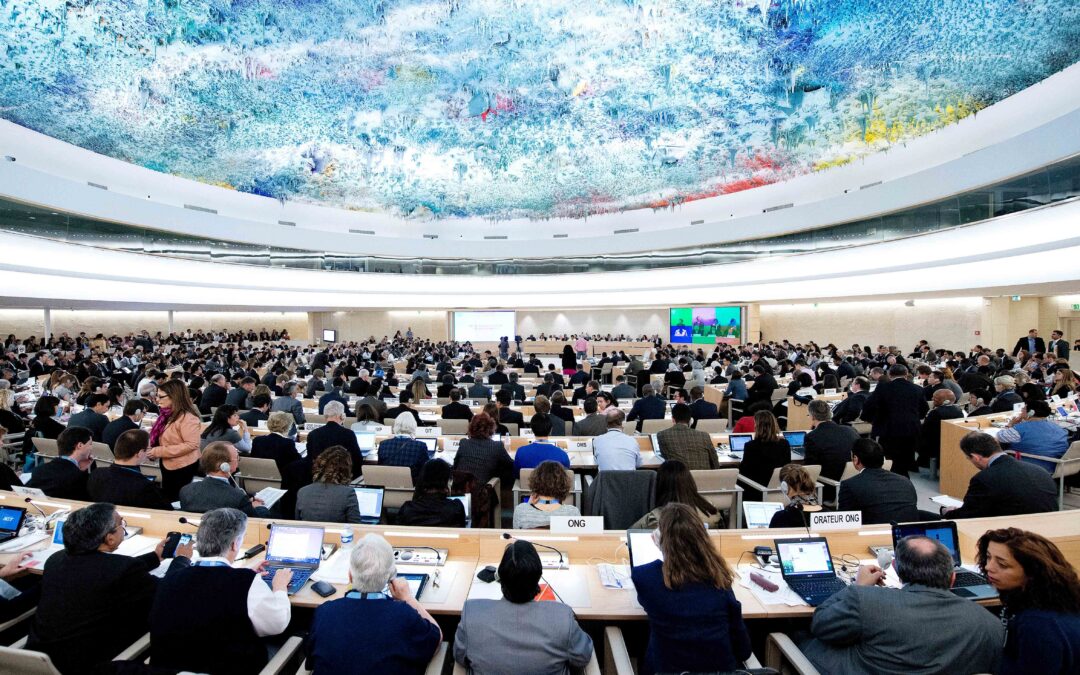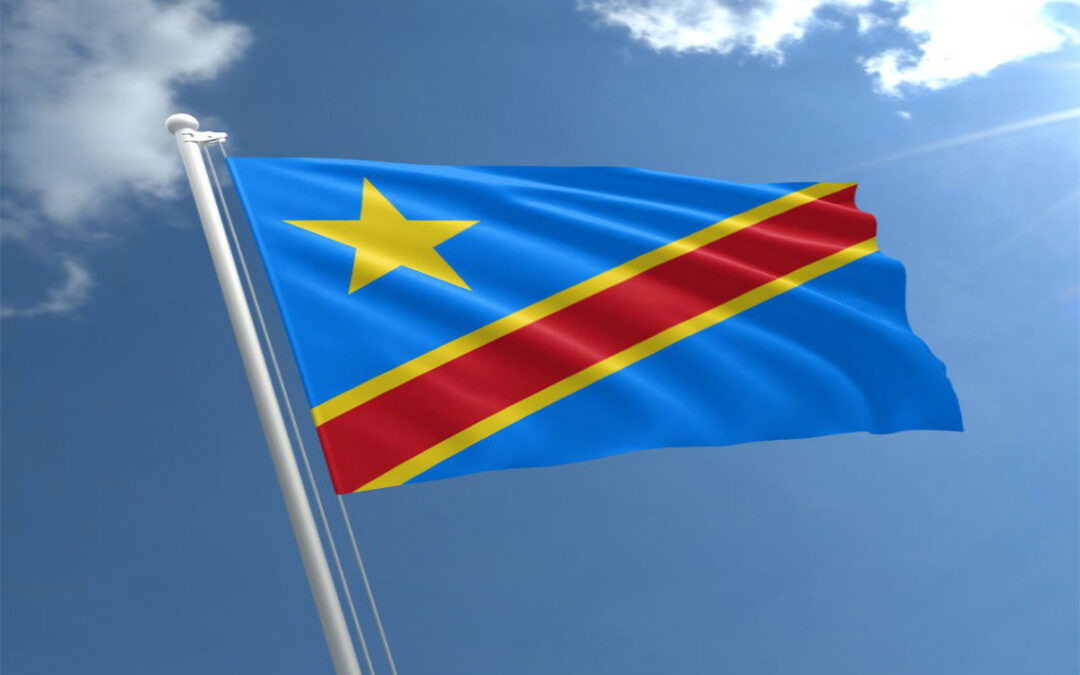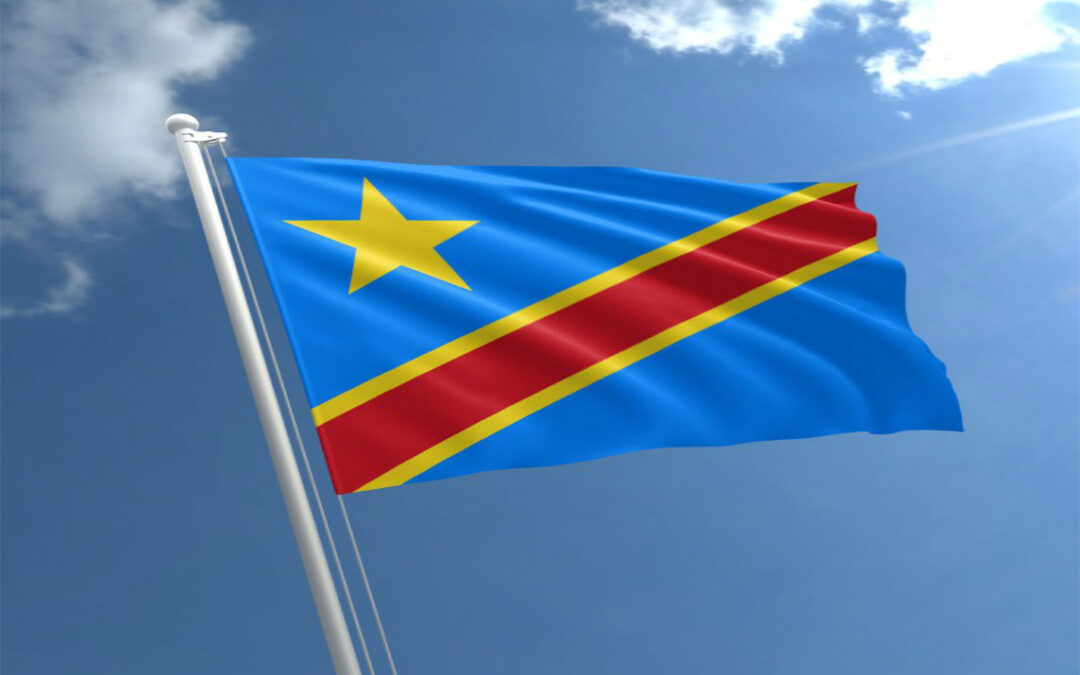
Jul 12, 2019 | Advocacy, Non-legal submissions
The ICJ joined other NGOs in an end-of-session statement, highlighting the achievements and shortfalls of the 41st Ordinary Session of the UN Human Rights Council, 24 June – 12 July 2019.
The statement, delivered by International Service for Human Rights (ISHR), reads as follows:
By renewing the mandate of the Independent Expert on protection against violence and discrimination based on sexual orientation and gender identity (SOGI), the Council has sent a clear message that violence and discrimination against people of diverse sexual orientations and gender identities cannot be tolerated. It reaffirmed that specific, sustained and systematic attention is needed to address these human rights violations and ensure that LGBT people can live a life of dignity. We welcome the Core Group’s commitment to engage in dialogue with all States, resulting in 50 original co-sponsors across all regions. However, we regret that some States have again attempted to prevent the Council from addressing discrimination and violence on the basis of SOGI.
The Council session also sent a clear message that Council membership comes with scrutiny by addressing the situations of Eritrea, the Philippines, China, Saudi Arabia and the Democratic Republic of Congo. This shows the potential the Council has to leverage its membership to become more effective and responsive to rights holders and victims.
The Council did the right thing by extending its monitoring of the situation in Eritrea. The onus is on the Eritrean Government to cooperate with Council mechanisms, including the Special Rapporteur, in line with its membership obligations.
We welcome the first Council resolution on the Philippines as an important first step towards justice and accountability. We urge the Council to closely follow this situation and be ready to follow up with additional action, if the situation does not improve or deteriorates further. We deeply regret that such a resolution was necessary, due to the continuation of serious violations and repeated refusal of the Philippines – despite its membership of the Council– to cooperate with existing mechanisms.
We deplore that Council members, such as the Philippines and Eritrea, sought to use their seats in this Council to seek to shield themselves from scrutiny, and those States[1] who stand with the authorities and perpetrators who continue to commit grave violations with impunity, rather than with the victims.
We welcome the written statement by 22 States on China expressing collective concern over widespread surveillance, restrictions to freedoms of religion and movement, and large-scale arbitrary detention of Uyghurs and other minorities in Xinjiang. We consider it as a first step towards sustained Council attention and in the absence of progress look to those governments that have signed this letter to follow up at the September session with a resolution calling for China to allow access to the region to independent human rights experts and to end country-wide the arbitrary detention of individuals based on their religious beliefs or political opinions.
We welcome the progress made in resolutions on the rights of women and girls: violence against women and girls in the world of work, on discrimination against women and girls and on the consequences of child, early and forced marriage. We particularly welcome the renewal of the mandate of the Working Group on Discrimination Against Women and Girls under its new name and mandate to focus on the intersections of gender and age and their impact on girls. The Council showed that it was willing to stand up to the global backlash against the rights of women and girls by ensuring that these resolutions reflect the current international legal framework and to resist cultural relativism, despite several amendments put forward to try and weaken the strong content of these resolutions.
However, in the text on the contribution of development to the enjoyment of all human rights, long standing consensus language from the Vienna Declaration for Programme of Action (VDPA) recognising that, at the same time, “the lack of development may not be invoked to justify the abridgement of internationally recognized human rights” has again been deliberately excluded disturbing the careful balance established and maintained for several decades on this issue.
We welcome the continuous engagement of the Council in addressing the threat posed by climate change to human rights, through its annual resolution and the panel discussion on women’s rights and climate change at this session. We call on the Council to continue to strengthen its work on this issue, given its increasing urgency for the protection of all human rights.
The Council has missed an opportunity on Sudan where it could have supported regional efforts and ensured that human rights are not sidelined in the process. We now look to African leadership to ensure that human rights are upheld in the transition. The Council should stand ready to act, including through setting up a full-fledged inquiry into all instances of violence against peaceful protesters and civilians across the country.
During the interactive dialogue with the Special Rapporteur on extrajudicial and summary executions, States heard loud and clear that the time to hold Saudi Arabia accountable is now for the extrajudicial killing of journalist Jamal Khashoggi. We recall that women human rights defenders continue to be arbitrarily detained despite the calls by 36 States at the March session. We urge States to adopt a resolution at the September session to establish a monitoring mechanism over the human rights situation in the country.
We welcome the landmark report of the High Commissioner on the situation for human rights in Venezuela; in response to the grave findings in the report and the absence of any fundamental improvement of the situation in the meantime, we urge the Council to adopt a Commission of Inquiry or similar mechanism in September, to reinforce the ongoing efforts of the High Commissioner and other actors to address the situation.
We welcome the renewal of the mandate on the freedom of peaceful assembly and association. This mandate is at the core of our work as civil society and we trust that the mandate will continue to protect and promote these fundamental freedoms towards a more open civic space.
We welcome the renewal of the mandate of the Special Rapporteur on Belarus. We acknowledge some positive signs of re-engagement in dialogue by Belarus, and an attempted negotiation process with the EU on a potential Item 10 resolution. However, in the absence of systemic human rights reforms in Belarus, the mandate and resolution process remains an essential tool for Belarusian civil society. In addition, there are fears of a spike in violations around upcoming elections and we are pleased that the resolution highlights the need for Belarus to provide safeguards against such an increase.
We welcome the renewal of the quarterly reporting process on the human rights situation in Ukraine. However, we also urge States to think creatively about how best to use this regular mechanism on Ukraine to make better progress on the human rights situation.
The continued delay in the release of the UN database of businesses engaged with Israeli settlements established pursuant to Council resolution 31/36 in March 2016 is of deep concern. We join others including Tunisia speaking on behalf of 65 states and Peru speaking on behalf of 26 States in calling on the High Commissioner to urgently and fully fulfil this mandate as a matter of urgency and on all States to cooperate with all Council mandates, including this one, and without political interference.
Numerous States and stakeholders highlighted the importance of the OHCHR report on Kashmir; while its release only a few days ago meant it did not receive substantive consideration at the present session, we look forward to discussing it in depth at the September session.
Finally, we welcome the principled leadership shown by Belgium, Luxembourg and the Netherlands, in pursuing accountability for individual victims of acts of intimidation and reprisals under General Debate Item 5, contrasting with other States which tend to make only general statements of concern, and call on States to raise all individual cases at the interactive dialogue on reprisals and intimidation in the September session.
(text in italics was not read out due to the limited time)
Signatories:
- International Service for Human Rights (ISHR)
- Amnesty International
- ARTICLE 19
- Asian Forum for Human Rights and Development (FORUM-ASIA)
- Association for Progressive Communications (APC)
- Cairo Institute for Human Rights Studies
- Center for Reproductive Rights
- CIVICUS: World Alliance for Citizen Participation
- DefendDefenders (the East and Horn of Africa Human Rights Defenders Project)
- Franciscans International
- Global Initiative for Economic, Social and Cultural Rights
- Human Rights House Foundation
- Human Rights Watch
- International Commission of Jurists (ICJ)
- International Federation for Human Rights (FIDH)
- International Lesbian and Gay Association (ILGA)
[1] States who voted against the resolution on Eritrea: Bahrain, Burkina Faso, Cameroon, China, Cuba, Egypt, Eritrea, Iraq, India, Saudi Arabia, Somalia, the Philippines and Pakistan.
States who voted against the resolution on the Philippines: Angola, Bahrain, Cameroon, China, Cuba, Egypt, Eritrea, Hungary, Iraq, India, Qatar, Saudi Arabia, Somalia, and the Philippines.

Jul 6, 2018 | Advocacy, News, Non-legal submissions
The ICJ today joined other NGOs in highlighting key outcomes of the 38th ordinary session of the UN Human Rights Council.
The statement, delivered by International Service for Human Rights (ISHR) at the end of the session, read as follows (text in italics was not read aloud due to the limited time available):
“Our organisations welcome the adoption of the resolutions on civil society space, peaceful protest, on violence against women and girls and on discrimination against women and girls and the Council’s rejection of attempts to impede progress on protecting civic space, peaceful protest and the rights to sexual and reproductive health.
On civil society space, the resolution recognizes the essential contribution that civil society makes to international and regional organisations and provides guidance to States and organisations on improving their engagement with civil society. On peaceful protest, it sets out in greater detail how international law and standards protect rights related to protests.
On violence against women and on discrimination against women, we consider that ensuring sexual and reproductive health and rights are vital in efforts to combat violence and discrimination against women, online and offline, as well as to ensure targeted and specific remedies to victims. We appreciate that the work of women human rights defenders towards this is recognised.
We consider the adoption of the resolution on the contribution of the Council to the prevention of human rights violations as an important opportunity to advance substantive consideration on strengthening the Council’s ability to deliver on its prevention mandate.
Following challenging negotiations, we welcome the adoption by consensus of the resolution on human rights and the Internet, reaffirming that the same rights that people have offline must also be protected online, and calling on States to tackle digital divides between and within countries, emphasising the importance of tools for anonymity and encryption for the enjoyment of human rights online, in particular for journalists, and condemning once more all measures that prevent or disrupt access to information online.
We welcome continued Council attention to Eritrea‘s abysmal human rights record. This year’s resolution, while streamlined, extends expert monitoring of, and reporting on, the country and outlines a way forward for both engagement and human rights reform. We urge Eritrea to engage in long-overdue meaningful cooperation.
We welcome the renewal of the mandate of the Special Rapporteur on Belarus under item 4 with an increased vote – as it is still the only independent international mechanism to effectively monitor human rights violations in Belarus – while remaining concerned over a narrative to shift the mandate to item 10 in the absence of any systemic change in Belarus.
We welcome the consensus resolution on the DRC, putting in place continued monitoring and follow up on the expert’s recommendations on the Kasais. However, given violations and abuses throughout several regions in the country, occurring against the backdrop of an ongoing political crisis, delayed elections, and the brutal quashing of dissent, we urge the Council to promptly move towards putting in place a country-wide mechanism that can respond to events on the ground as they emerge.
We welcome the strong resolution on Syria, which condemns violations and abuses by all parties, and appropriately addresses concerns raised by the COI about the use of chemical weapons, sexual and gender-based violence, and the need to address situations of detainees and disappearances. The Council cannot stay silent in the face of continued atrocities as the conflict continues unabated into its seventh year.
We welcome the joint statements delivered this session on Cambodia, the Philippines, and Venezuela. We urge Council members and observers to work towards increased collective action to urgently address the dire human rights situations in these countries.
On the Philippines, we emphasise that the Council should establish an independent international investigation into extrajudicial killings in the ‘war on drugs’ and mandate the OHCHR to report on the human rights situation and on moves toward authoritarianism.
The joint statement on Cambodia represents a glimmer of hope after the Council’s failure to take meaningful action against clear sabotage of democratic space ahead of elections. Close scrutiny of the human rights situation before, during and after the elections is paramount and the Council must take immediate action on current and future human rights violations in this regard.
We welcome the joint statement delivered by Luxembourg calling on the HRC President to provide oral updates on cases of alleged intimidation or reprisal, including actions taken, at the start of the Item 5 general debate of each Council session and also provide States concerned with the opportunity to respond.
Finally, the new Council member to replace the United States of America should demonstrate a principled commitment to human rights, to multilateralism and to addressing country situations of concern by applying objective criteria.
Signatories:
- Asian Forum for Human Rights and Development (FORUM-ASIA)
- The Association for Progressive Communications
- The Center for Reproductive Rights (CRR)
- CIVICUS: World Alliance for Citizen Participation
- DefendDefenders (the East and Horn of Africa Human Rights Defenders Project)
- Human Rights House Foundation (HRHF)
- International Commission of Jurists (ICJ)
- The International Lesbian, Gay, Bisexual, Trans and Intersex Association (ILGA)
- International Service for Human Rights (ISHR)

Sep 27, 2017 | News
The ICJ has welcomed the recent decision of the African Commission on Human and Peoples’ Rights (ACHPR) on a recent decision found the Democratic Republic of Congo (DRC) responsible for the massacre of 70 people in Kilwa in 2004.
In its decision, the Commission not only urges the DRC State to pay 2.5 million US dollars compensation to eight victims and their families but also urges the DRC to prosecute Anvil Mining’s personnel involved in the massacre.
The African Commission also acknowledged the involvement of mining company Anvil Mining, an Australian-Canadian company (later bought by the Chinese company MinMetals) operating a copper and silver mine in Dikulushi, located 50 kilometers from Kilwa, that would
have provided logistical support to soldiers who bombarded civilians.
This decision sheds light on the corporate legal responsibility for human rights abuses, particularly in the extractive
industry sector, and suggests legal avenues for action against Anvil for alleged abuses.
Universal-KilwaMassacre-News-2017-ENG (full pdf ENG)

Sep 19, 2012 | News
 The ICJ has noted with grave concern reports that the National Director of Public Prosecutions in DRC has given an instruction urging senior members of the National Bar Association to dismiss Bâtonnier Mbuyi Mbiye Tanayi.
The ICJ has noted with grave concern reports that the National Director of Public Prosecutions in DRC has given an instruction urging senior members of the National Bar Association to dismiss Bâtonnier Mbuyi Mbiye Tanayi.
The President of the National Bar, Bâtonnier Mbuyi Mbiye is known to persistently denounced attacks on the independence of the judiciary by the Executive and has often exhorted the lawyers in the ongoing Chebeya case to discharge their duties without any fear or favour.
It is significant to note on or around 12 July 2012, intelligence service officers carried out searches at Bâtonnier Mbiye’s home and chambers without search warrants, and proceeded to confiscate his computers on allegations that he is linked with the M23 rebel movement.
As we release this document, senior members of the National Bar Association are reportedly going to meet in a few hours and discuss the possible removal of Bâtonnier Mbuyi Mbiye from the leadership of the National Bar Association, as instructed by the Procureur Général de la République (PGR, the National Director of Public Prosecutions).
The ICJ considers that PGR’s interference with the running of the affairs of the Bar Association and the persecution of Bâtonnier Mbuyi Mbiye constitute a blatant violation of the independence of individual lawyers as well as of the legal profession as a whole, as provided for by the UN Basic Principles on the Role of Lawyers and the Principles and Guidelines on the Right to a Fair Trial and Legal Assistance in Africa.
The instruction given to senior bar members also seriously undermines the independence of the judiciary, which is guaranteed by the Constitution of DR Congo, as well as at international level by Article 14 of the International Covenant on Civil and Political Rights and Article 26 of the African Charter on Human and Peoples’ Rights, to which DR Congo is a State party.
The ICJ observes that the independence of lawyers is essential for the protection and promotion of the rule of law and human rights in a constitutional democracy. This independence requires that lawyers be subject to self-regulation, which is free from improper and undue interference, and observes principles of professional ethics.
Self-regulation ensures the protection of every one’s right to independent lawyers who adhere to legal principles, which uphold the rule of law and respect for human rights. For members of the public to access justice, they need the assurance that when requiring legal representation in any matter, including those against the state, they will be represented will be represented by lawyers who serve the interests of justice without fear or favour.
“Interference of the state’s prosecutorial authority in the affairs of the legal profession can only weaken the rule of law and human rights, and erode public confidence in the justice system. In any constitutional democracy, senior bar members cannot be instructed even to hold a meeting, let alone to dismiss their leader.”, commented Arnold Tsunga, Director of the ICJ Africa Regional Programme.
The ICJ strongly urges the Procureur Général de la République to desist from interfering with the affairs of the Bar Association and put an end to persecutions against Bâtonnier Mbuyi Mbiye.
The ICJ also exhorts senior Bar members to reject PGR’s instructions and resist any unwarranted manipulation of the Bar Association.
Further, the ICJ calls upon competent Congolese authorities to ensure at all times that the Bar Association, its leaders and members of the legal fraternity are able to discharge their duties without fear or threat of reprisals.
Contact:
Johannesburg: Linda Mtshali, Associate Legal Advisor, ICJ, Africa Regional Programme, t +27 11 024 8268; e-mail: linda.mtshali(at)icj.org
Geneva: Ilaria Vena, Associate Legal Advisor, ICJ, Centre for the Independence of Judges and Lawyers, t +41 22 979 38 27; e-mail: ilaria.vena(at)icj.org
DRC-Persécution contre le bâtonnier-press release-2012-french (full text in PDF)
Photo credit: Radio Okapi/John Bompengo
Feb 23, 2012
Democratic Republic of the Congo 101. JUA 09/02/11 Case no.: COD 2/2011 State Reply: 07/02/11 – Allégation de menaces contre des défenseurs des droits de l‟homme. 102. JUA 15/04/11 Case no. COD 2/2011 State Reply: None to date – Allégation de menaces et...









